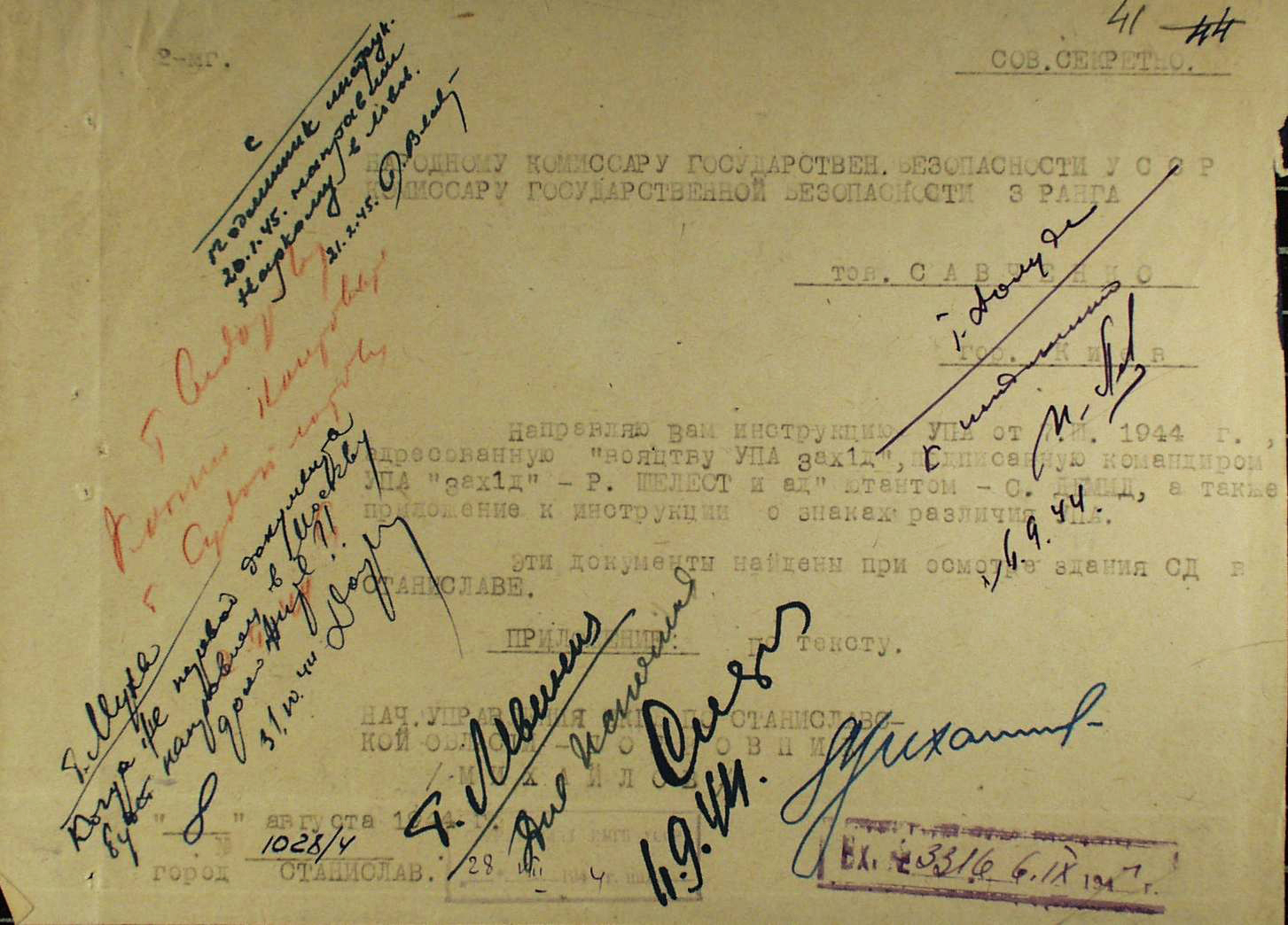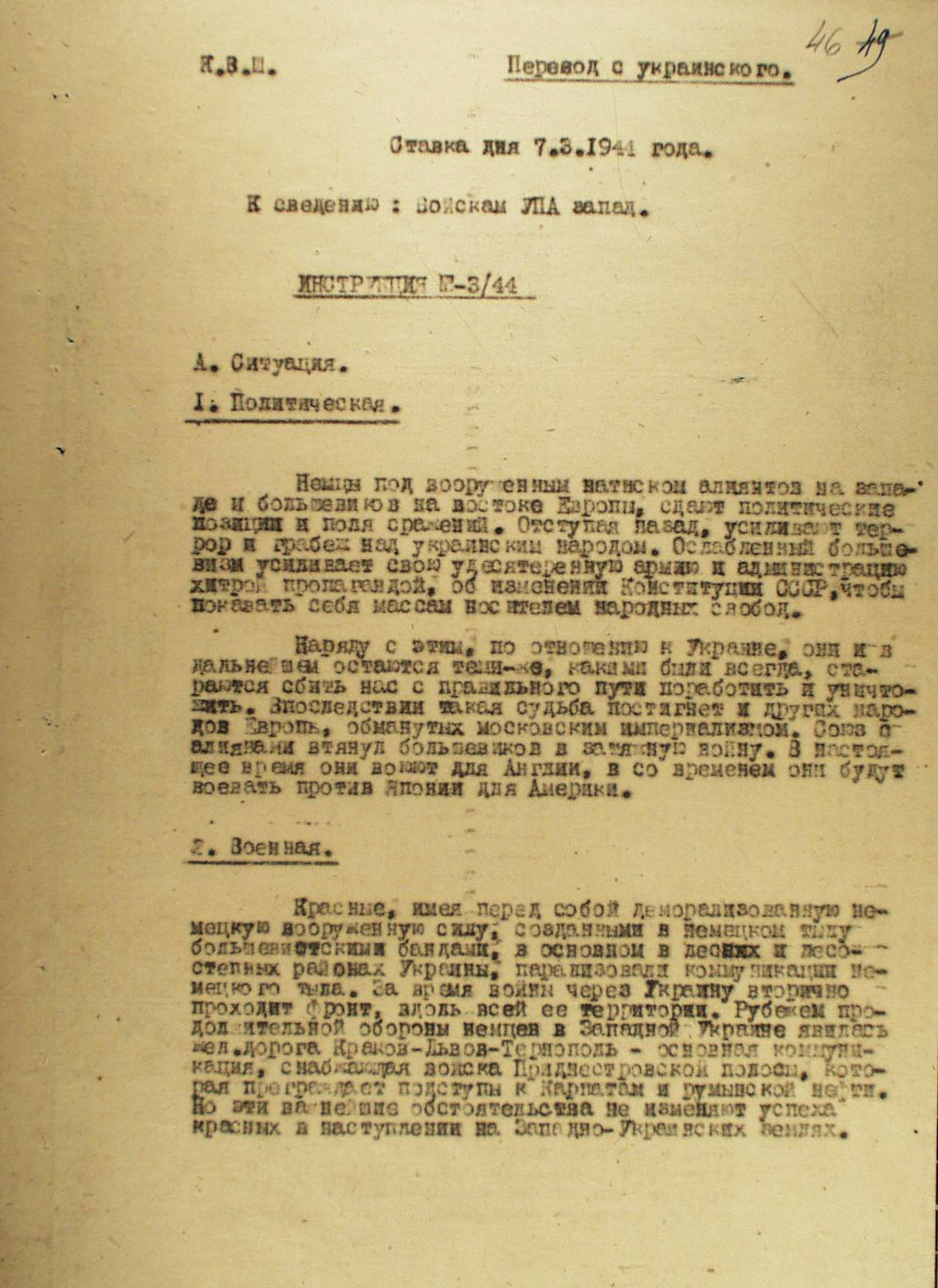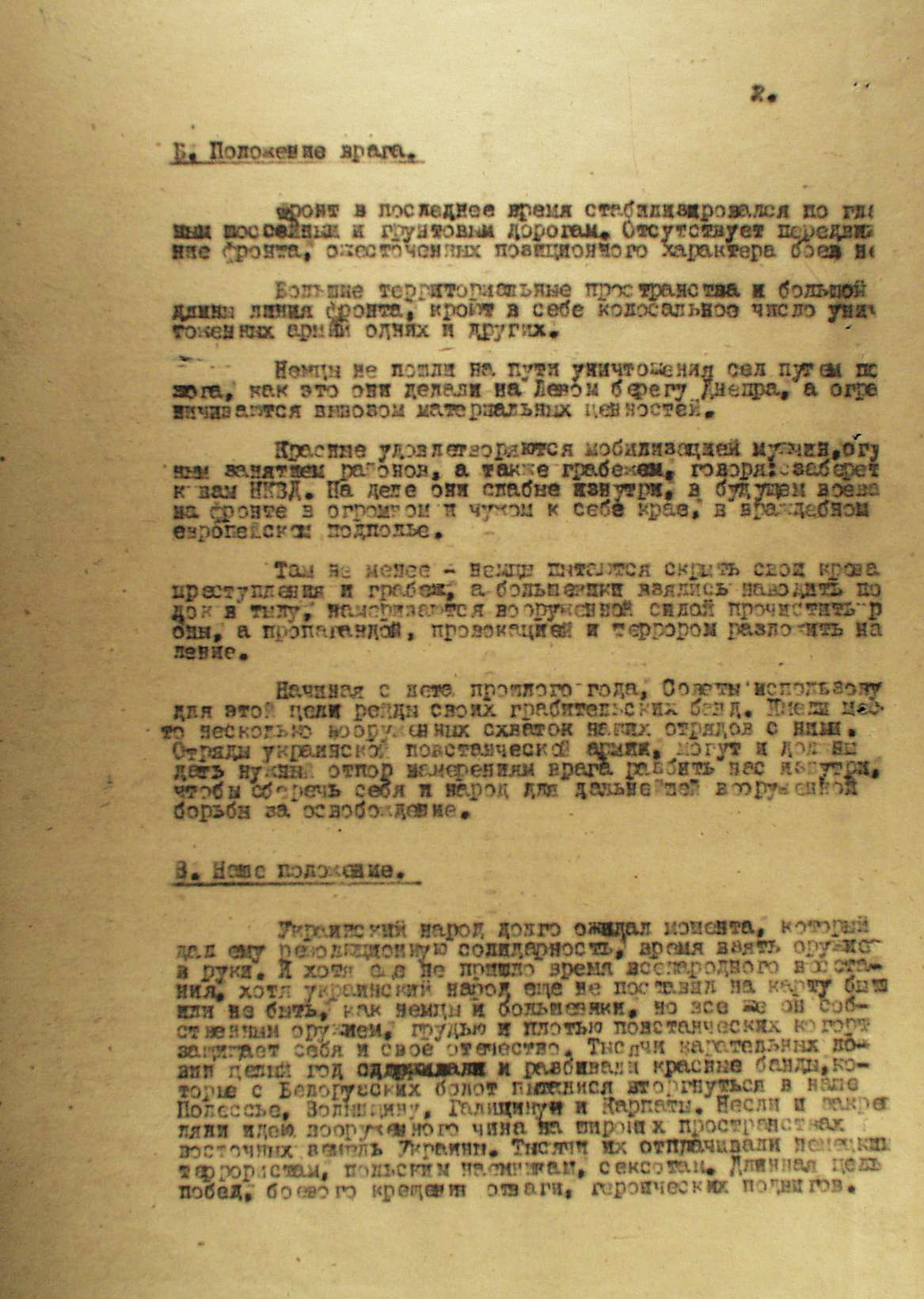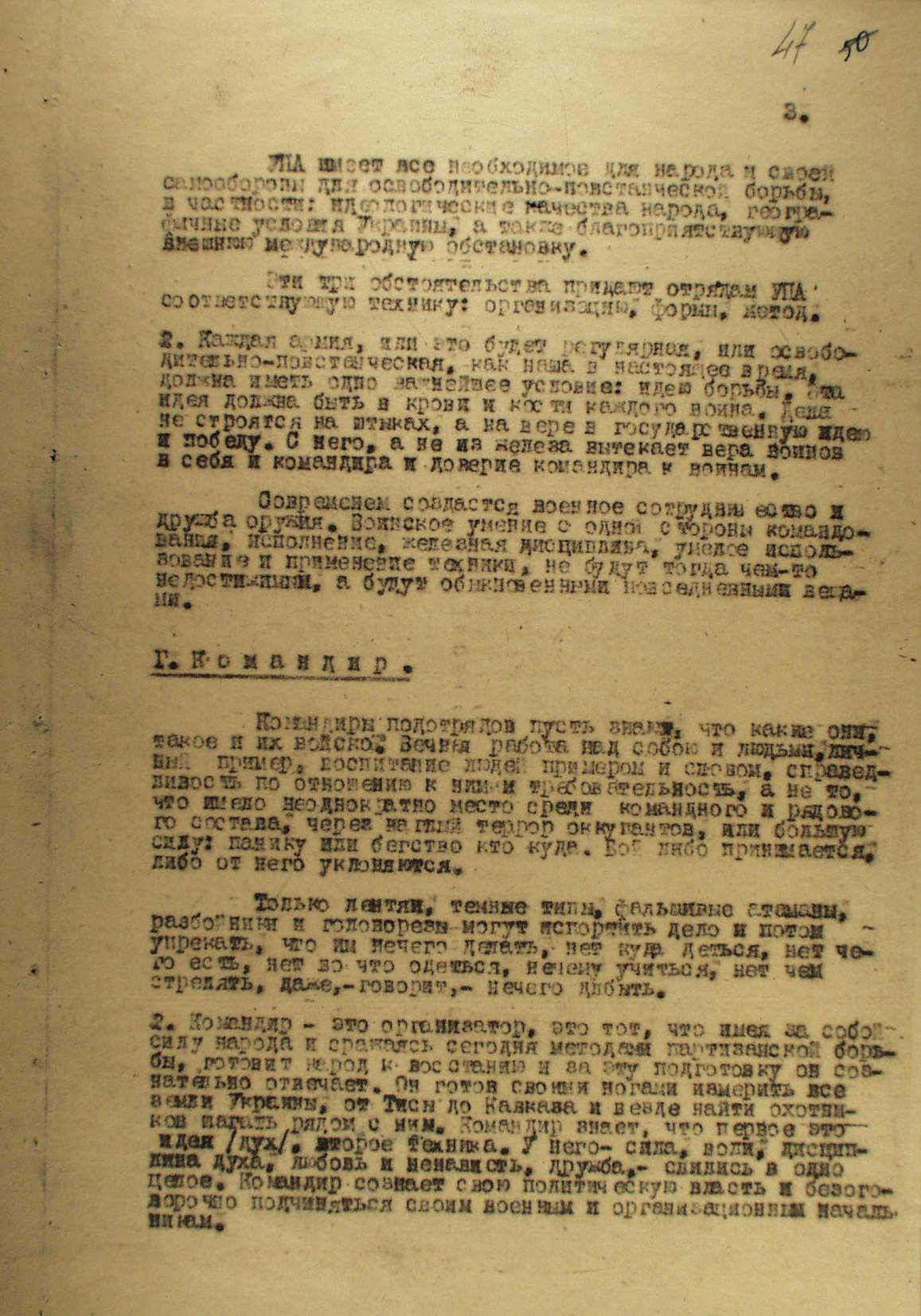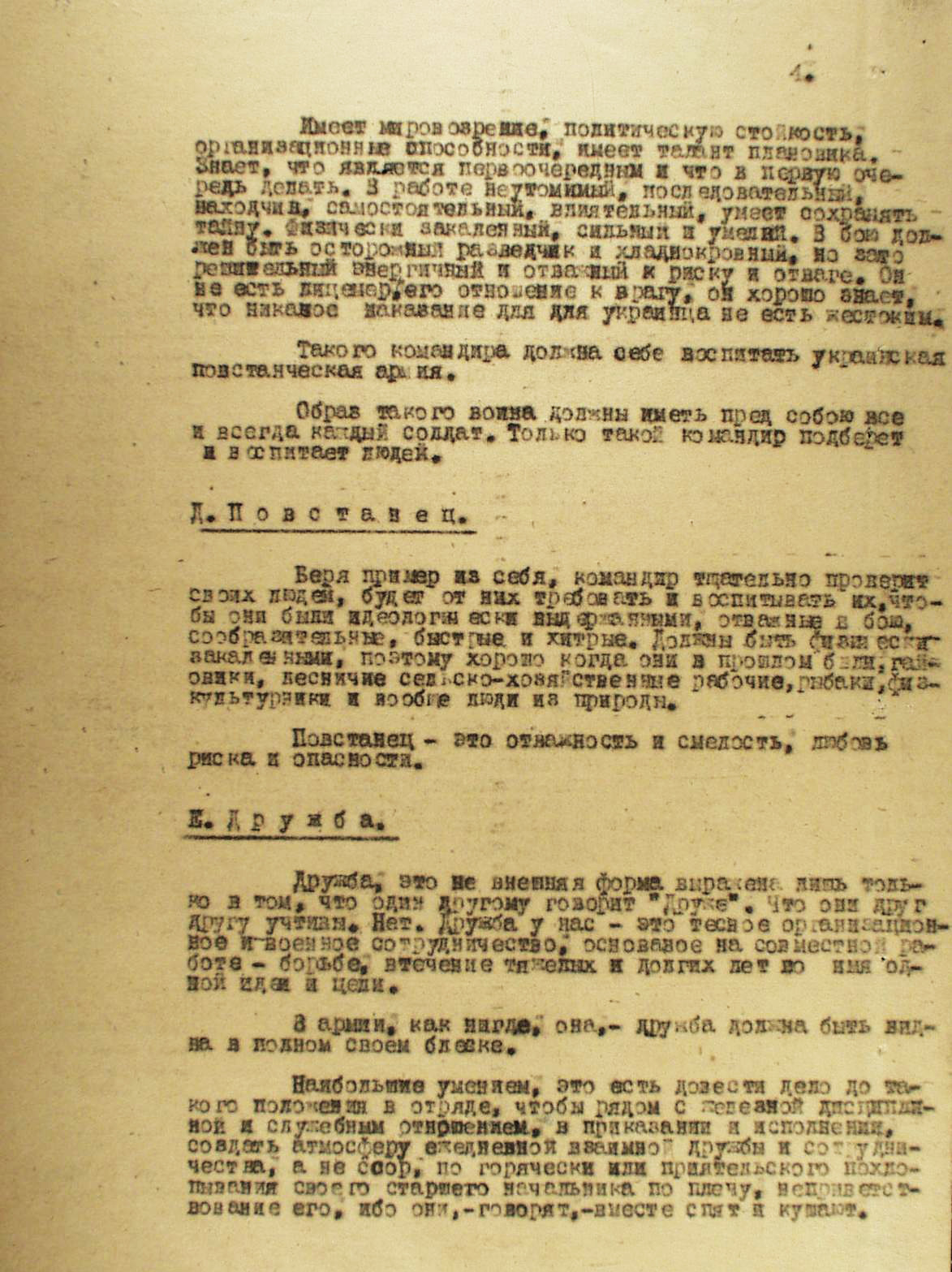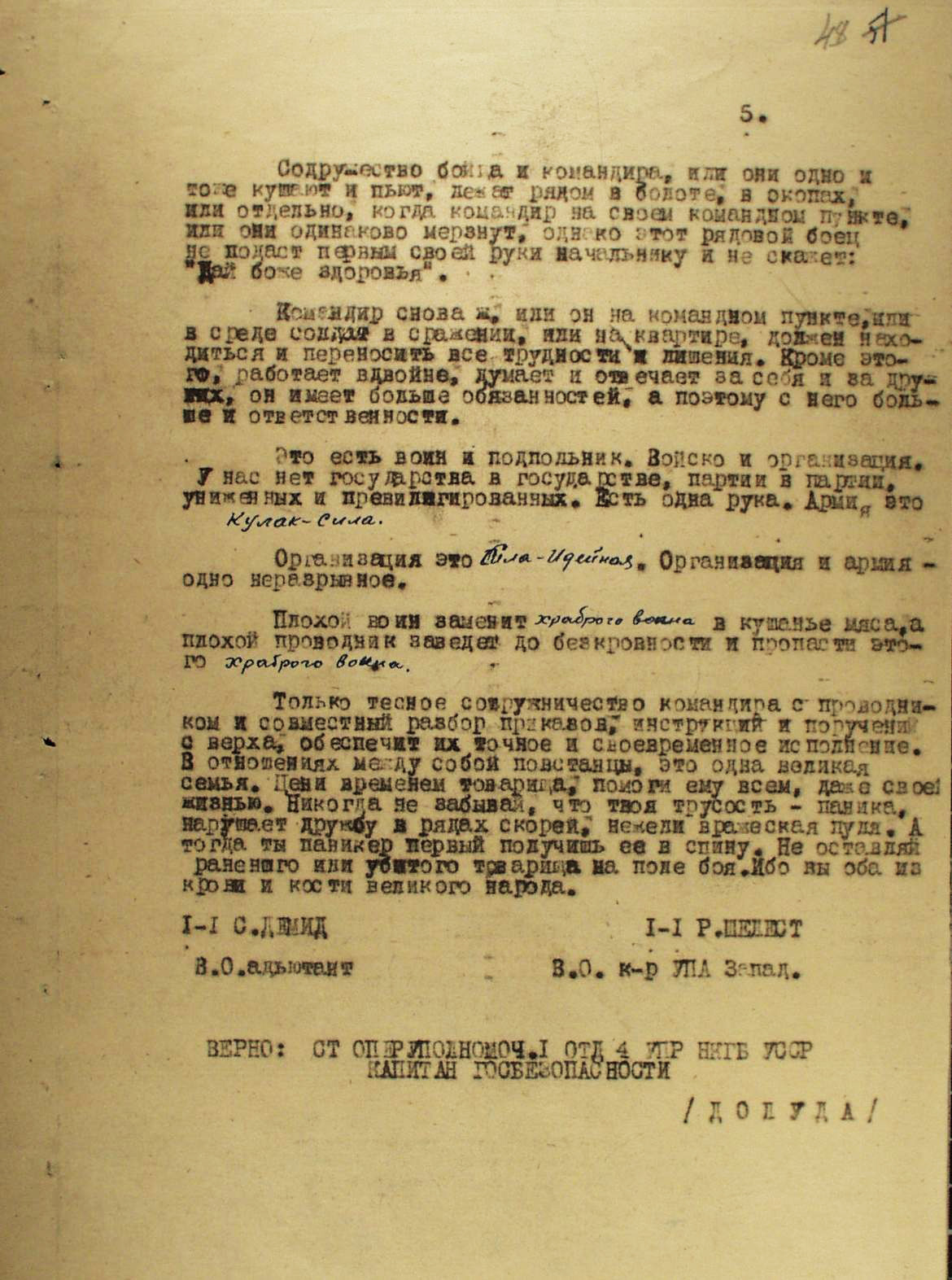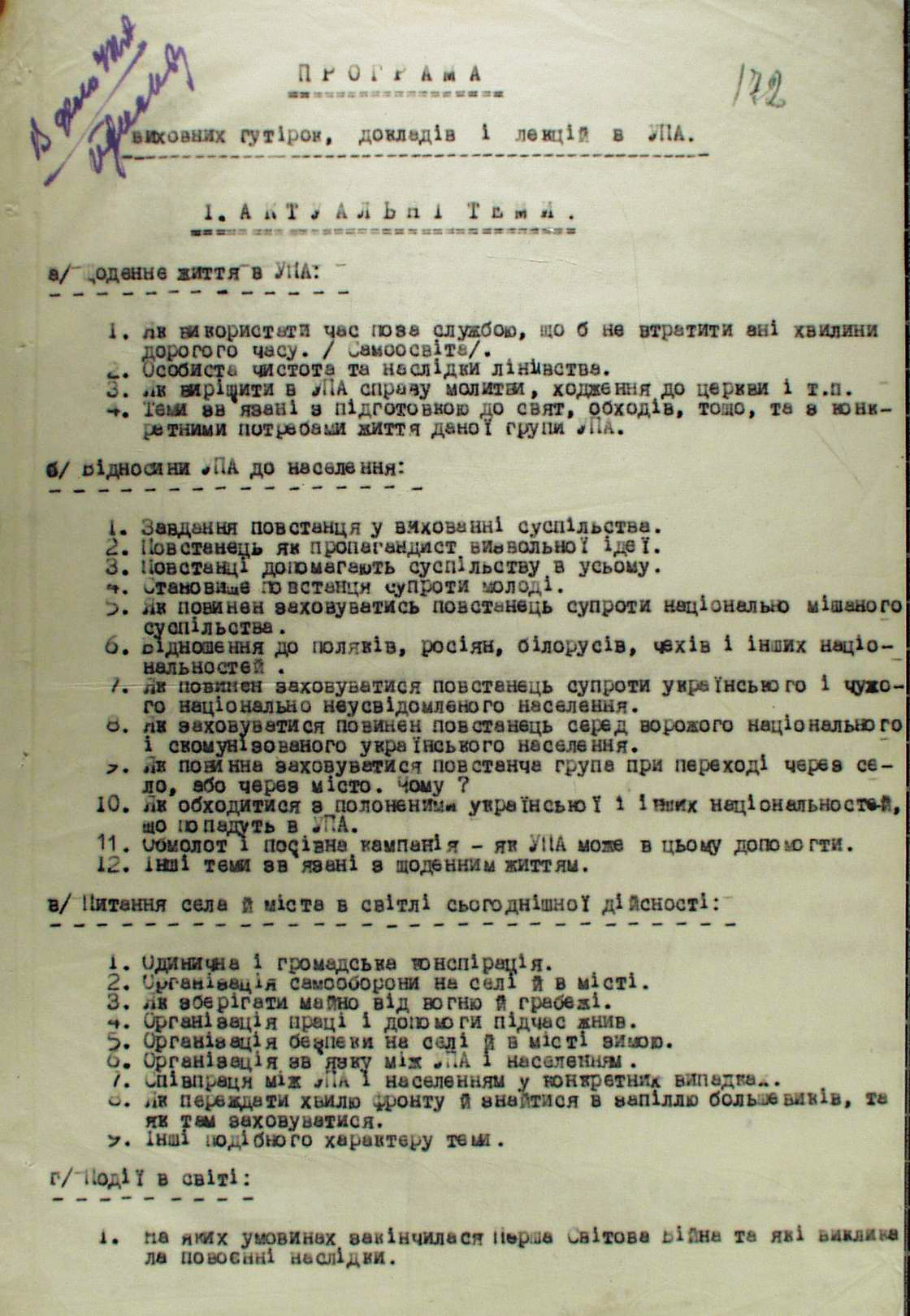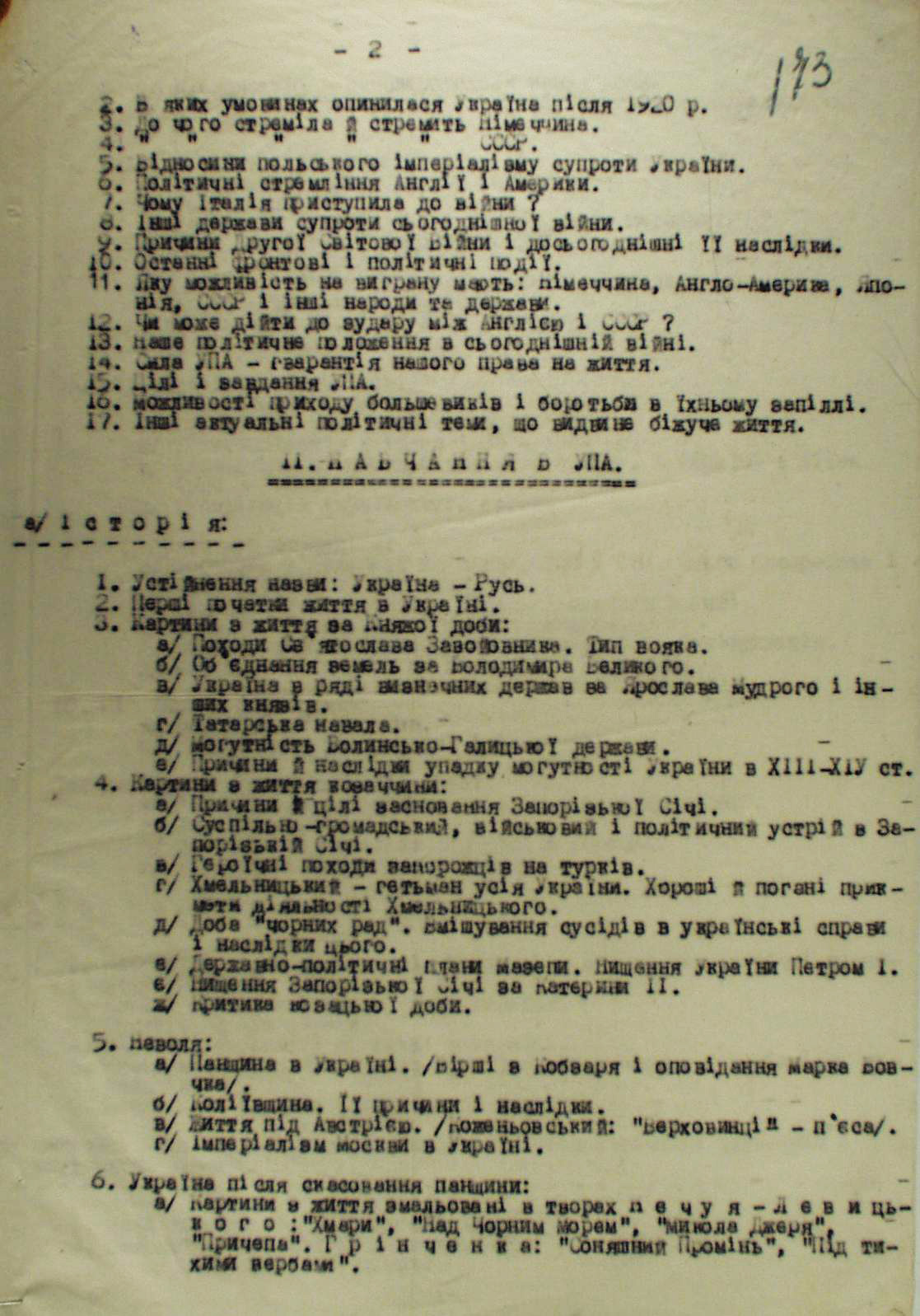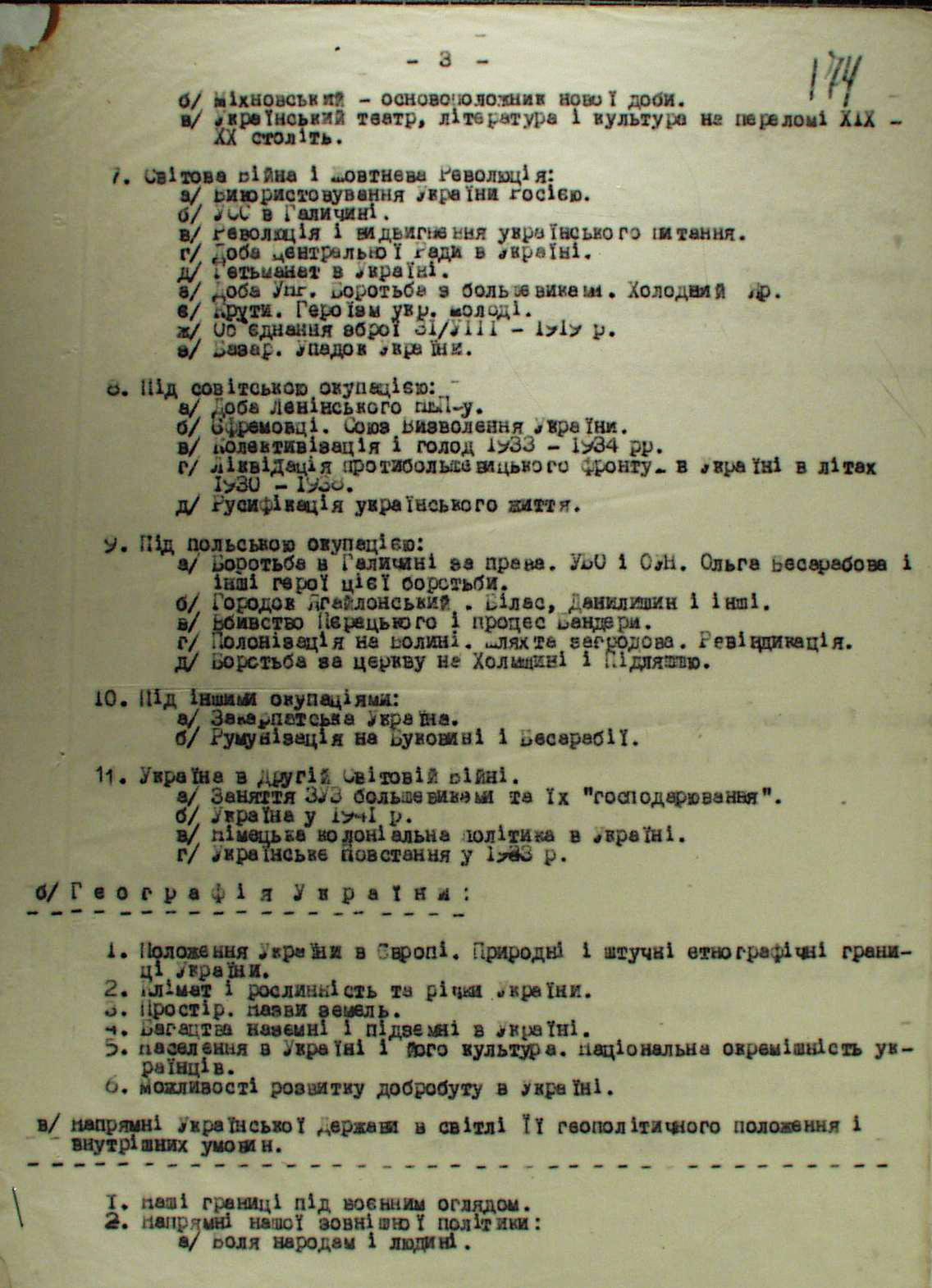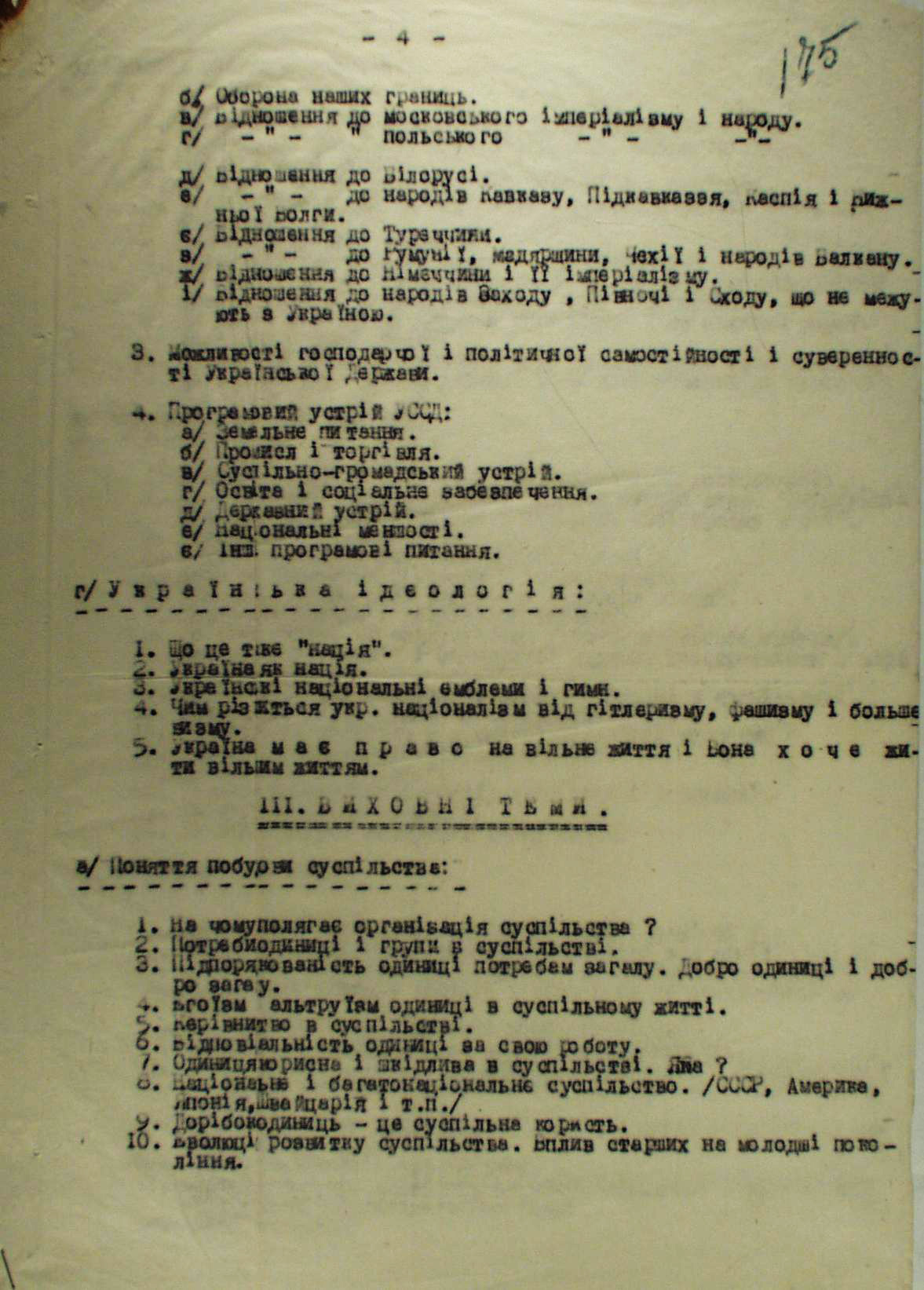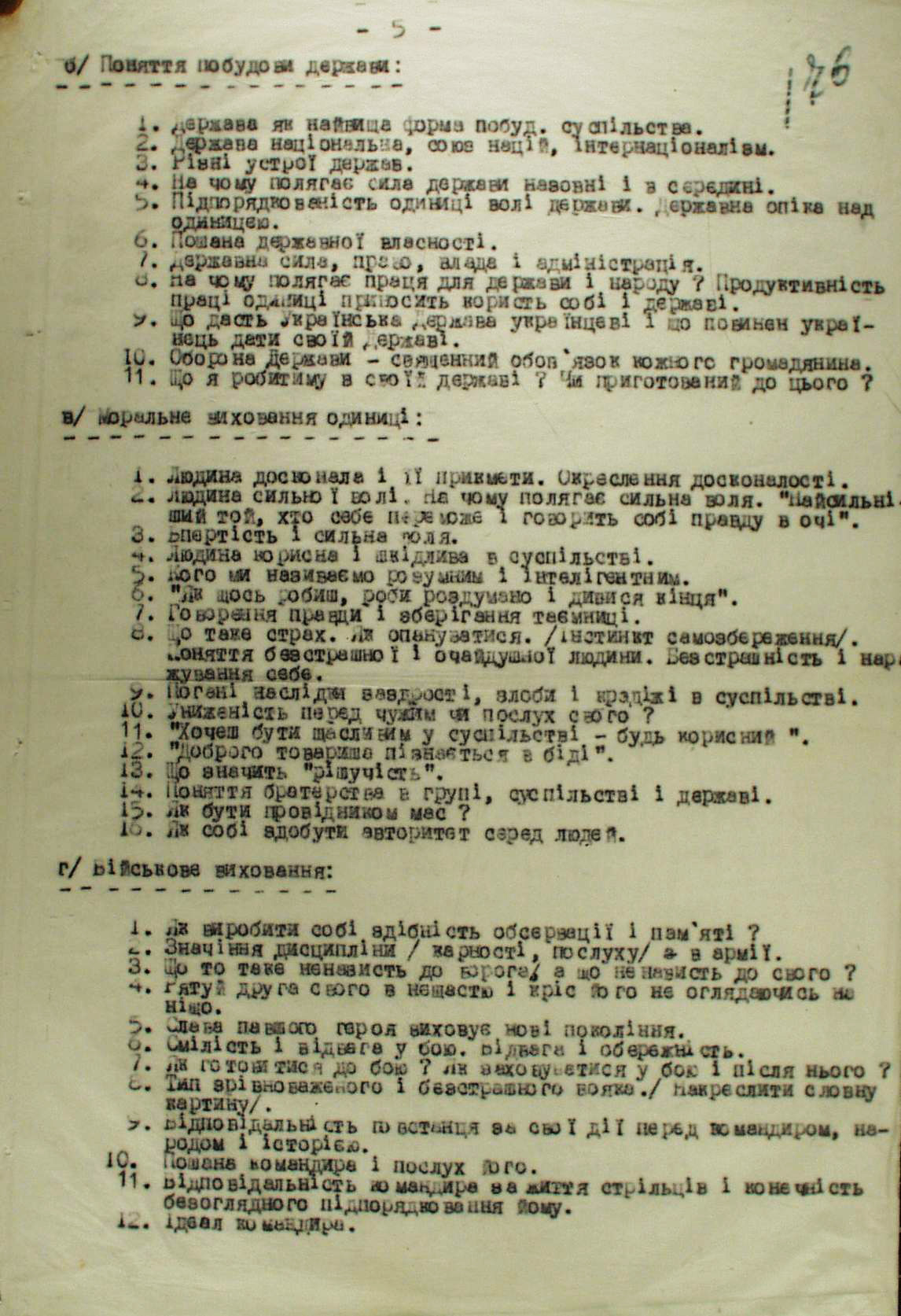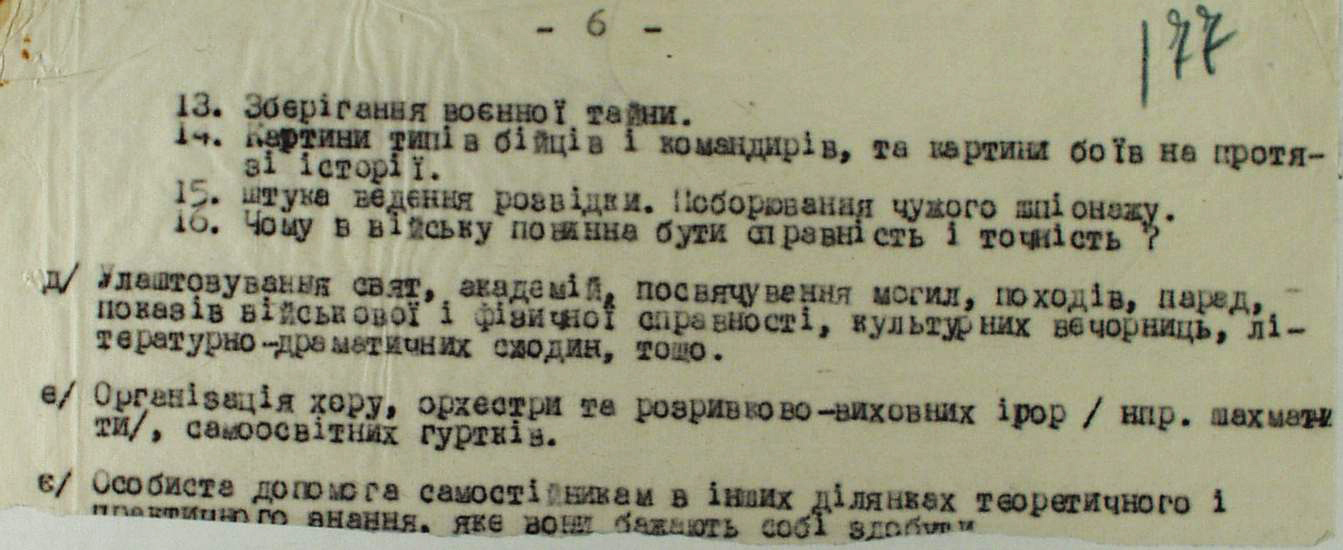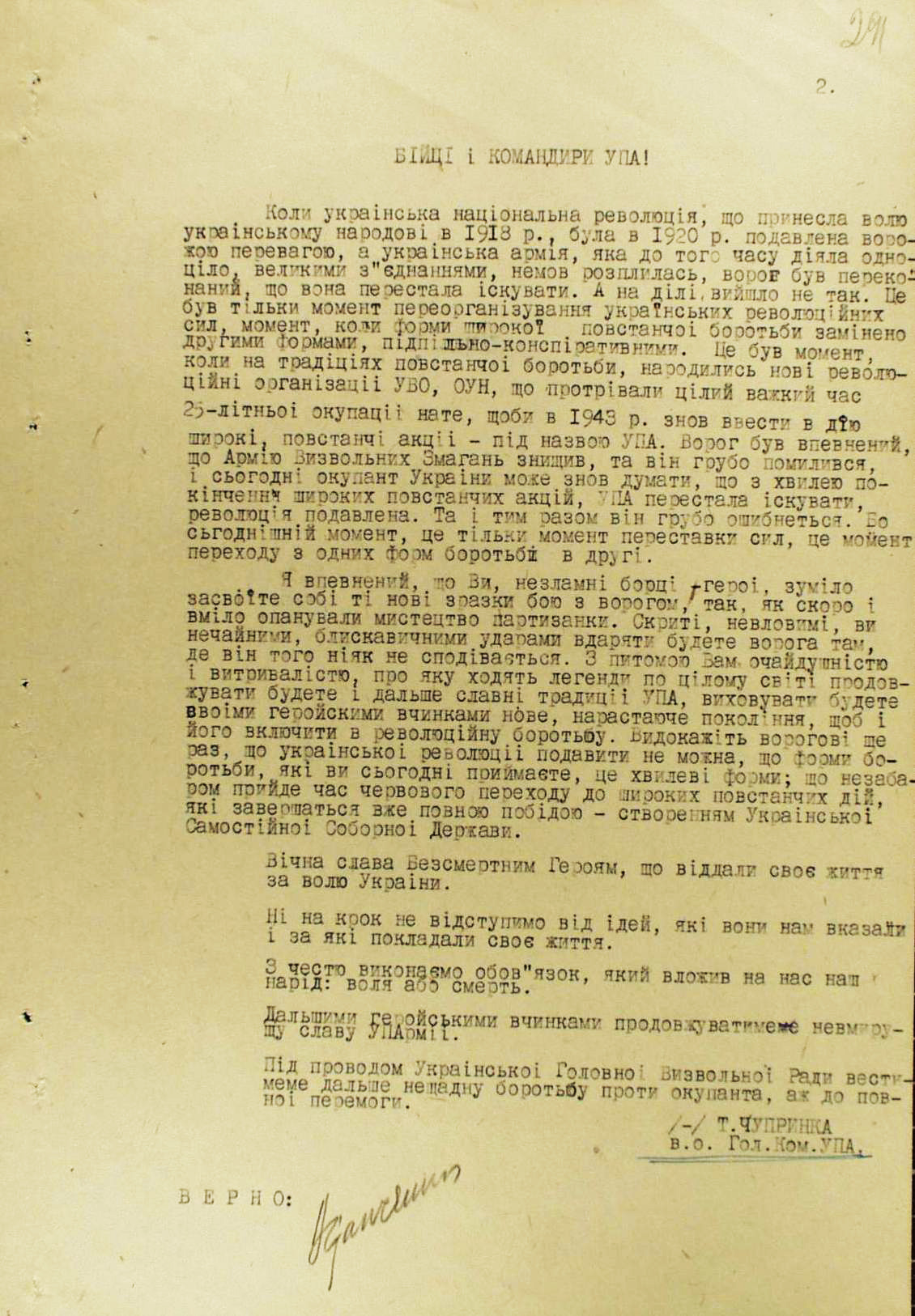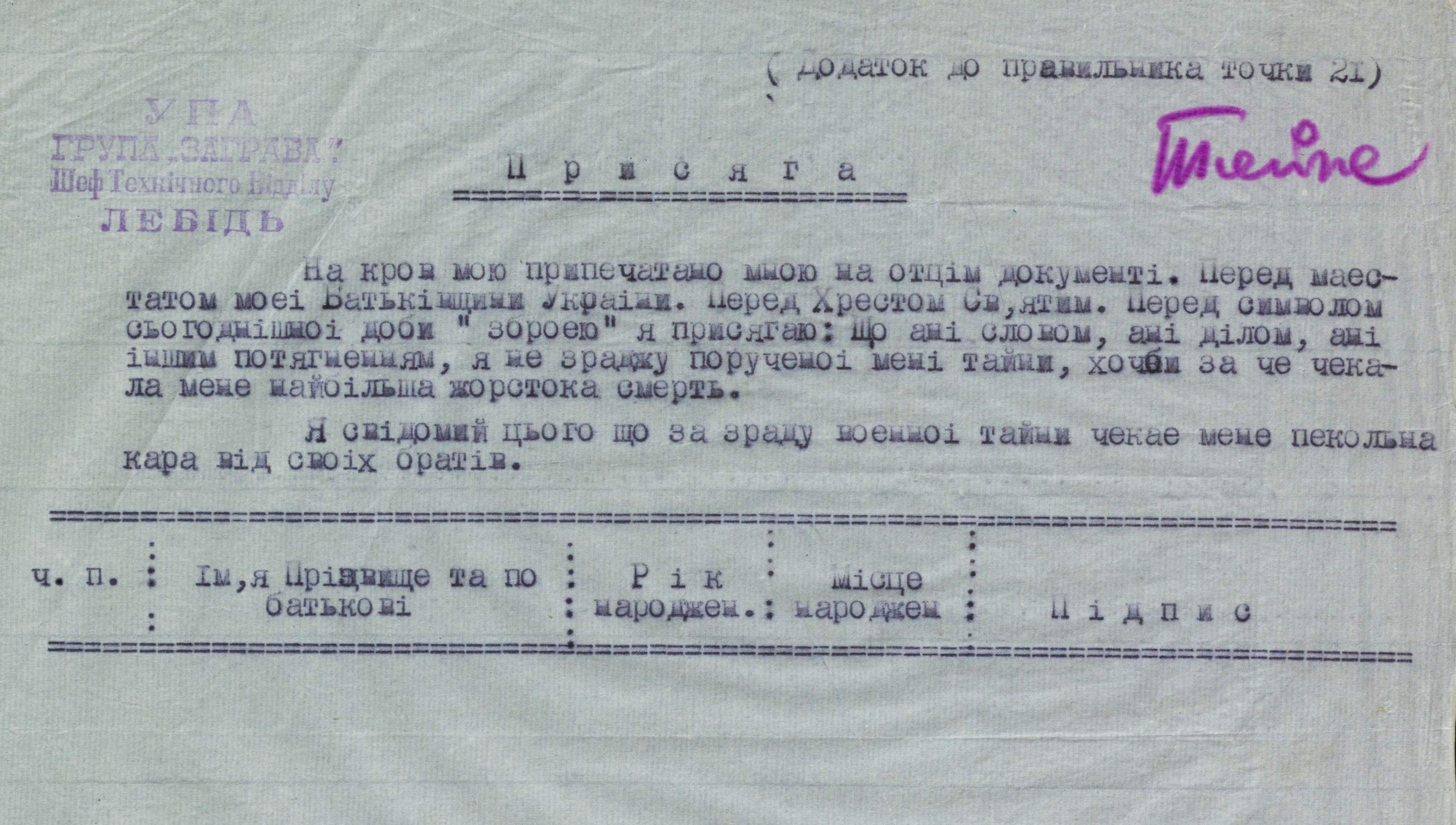“...And You Will Pass On to Future Generations Your Name Shrouded in Immortal Glory”
10/1/2024
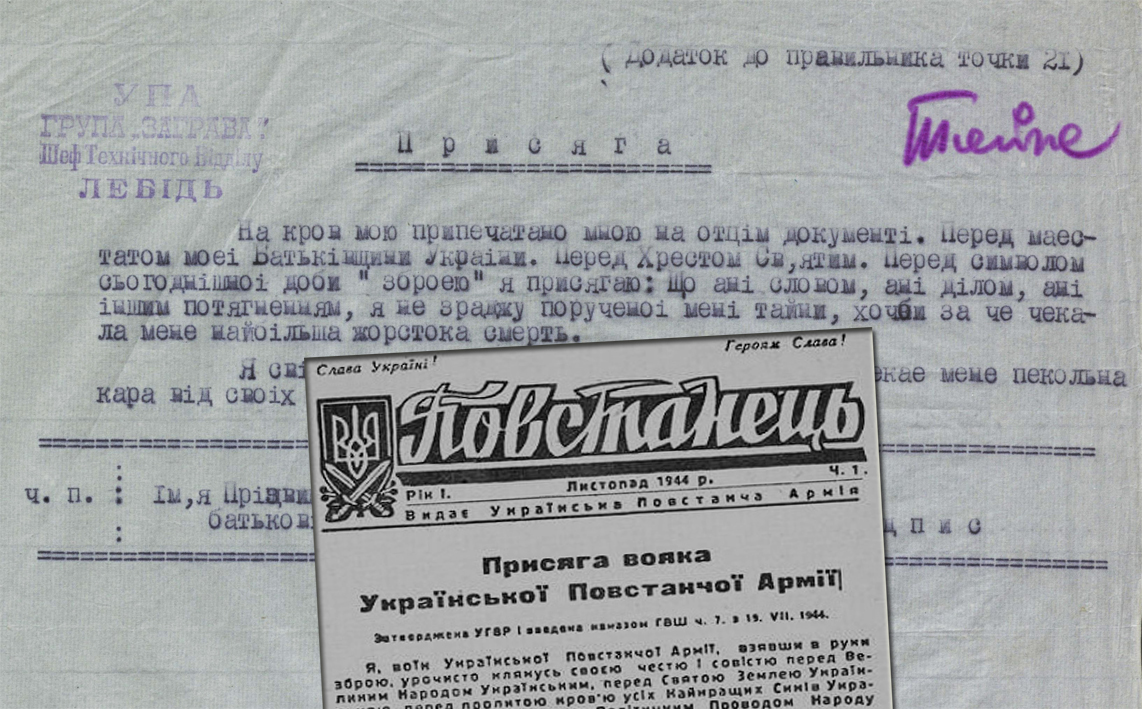
“The UPA is the armed force of the Ukrainian people. Fighting in the ranks of the UPA is an honorable duty of every citizen of Ukraine”. These phrases are very often found in instructions, orders, proclamations, and leaflets of the Ukrainian Insurgent Army, which have been preserved in the archives of the Foreign Intelligence Service of Ukraine. By doing so, the leading figures of the Ukrainian national liberation movement fostered respect for their own army and those who with weapons in his hands stood up to defend their native land from all sorts of invaders. Referring to these documents allows us to understand what gave Ukrainians strength in that difficult struggle against the enemy.
Along with guidelines, instructions, and combat orders, the UPA prepared many documents and published brochures and other literature on what its servicemen should be like, what knowledge they should have about Ukraine and the situation in the world, what traits of character they should cultivate, how to prepare for battle and encounters with the enemy, how to survive in the forest and other difficult conditions in heat and cold, how to toughen up body and spirit, how to treat their comrades-in-arms and fulfill orders from commanders.
Great importance was attached to the oath, both the text and the ritual. The well-known text, approved by the Ukrainian Main Liberation Council and introduced by order of July 19, 1944, begins with the following words: “I, a fighter of the Ukrainian Insurgent Army, having taken up arms, swear by my honor and conscience before the Great Ukrainian People, before the Holy Land of Ukraine, before the blood of all the Best Sons of Ukraine, and before the Highest Political Provid of the Ukrainian People:
To fight for the complete liberation of all Ukrainian lands and Ukrainian people from invaders and to succeed in creating Ukrainian Independent Unified State. In this struggle, I will spare neither blood nor life, and I will fight to my last breath and the final victory over all the enemies of Ukraine...”
But there were other texts of the oath that were drawn up in the UPA's structural units. In particular, the archives of the Foreign Intelligence Service of Ukraine contain a sample of the oath of the Zahrava group. It fell into the hands of the chekists in December 1947, along with other documents of the Commander of the Zahrava group's Political Department, Zymovyi, in the village of Yuzefin, Derazhnia district, Rivne region, as a result of the chekists’ operation. The text of this oath is shorter but at the same time, more emotional. “I have sealed this document with my blood”, it reads, “Before my Motherland Ukraine. Before the Holy Cross. Before the symbol of today's time, with the “weapon”, I swear that I will not betray the secret entrusted to me, either by word, deed, or other impulse, even if the most cruel death awaits me for this. I am aware that for betraying a military secret, a hell’s punishment from my brothers-in-arms awaits me” (BSA of the SZR of Ukraine. - F. 1. - Case 7335. - P. 11).
A cornerstone of the texts of the oath and other documents is the idea that the main goal of the armed struggle is to gain an independent united Ukraine. And everything should be subordinated to this idea. In particular, an instruction dated March 7, 1944, addressed to the “servicemen of the UPA-West” and signed by the Commander of the “West” group, R. Shelest, contains the following words: “Every army, whether it is a regular army or a liberation-insurgent army like ours today, must have one most important feature: the idea of struggle. This idea must be in the blood and bones of every warrior. Causes are not based on bayonets, but on faith in the state idea and victory. It is from this belief, not from iron, that the servicemen’s faith in themselves and in their commander, as well as the commander's trust in the soldiers, is cast”.
The instruction says that the commander should be an organizer, an authority for the insurgents, and share all the difficulties in campaigns and in battle with them. “He is the one who, having the power of the people behind him and fighting now with the methods of guerrilla warfare, prepares the people for the insurgency and is consciously responsible for this preparation. He is ready to measure with his feet all the lands of Ukraine from the Tysa to the Caucasus and find people willing to march alongside him everywhere. The commander knows that the idea (spirit) is first, the technique is second. He has willpower, discipline of spirit, love, hatred and friendship merged into one. The commander is aware of his political power and the need to unconditionally obey his military and organizational superiors”.
The instruction also demanded discipline and strict execution of orders by the insurgents' subordinates. The insurgents were described as one big family. “Cherish your comrade,” the text emphasized, “help him with everything, even at the cost of your life. Never forget that your cowardice and panic break friendship in the ranks faster than an enemy bullet. And when you panic, you will be the first to receive it in your back. Do not leave a wounded or killed comrade on the battlefield. For you are both of the blood and bones of a great nation” (BSA of the SZR of Ukraine. - F. 1. - Case 7088. - V. 2. - P. 46-48).
In the educational work, certain guidelines and normative documents were used, which were developed by the commanders of the Ukrainian Army during the national liberation struggle of 1917-1921 and the Ministry of Military Affairs of the State Center of the Ukrainian People’s Republic in exile. At the same time, taking into account the new realities and the accumulated experience of warfare, they created their own instructional documents, which concentrated the idea of the functions and organization of UPA units.
Among the archival documents there is the “Program of Educational Meetings, Reports, and Lectures in the UPA”. It consists of several sections. In the section “Education in the UPA” it was proposed to discuss the following issues:
- The origin of the name “Ukraine-Rus”;
- Sviatoslav the Conqueror’s campaigns;
- the Tatar invasion;
- the power of Galicia - Volyn state;
- heroic campaigns of the Cossacks;
- Khmelnytskyi - Hetman of the whole of Ukraine; good and bad sides of Khmelnytsky's activity;
- the era of “black councils”; neighbors’s interference in Ukrainian affairs and the consequences of this;
- Mazepa's state-political plans; destruction of Ukraine by Peter I;
- destruction of the Zaporozhian Sich under Catherine II;
- moscow's imperialism in Ukraine;
- the UPR era, the struggle against the bolsheviks, Kholodnyi Yar;
- Kruty, the heroism of Ukrainian youth;
- the struggle in Halychyna for rights, the UVO and OUN, Olha Basarab and other heroes of this struggle, etc.
Apart from the history and liberation struggle, many topics in the Program are devoted to the political situation in the world, the geography of Ukraine, the land issue, construction of the Ukrainian state and society, ideology, including the concept of the “Ukrainian nation”, the national anthem, flag and emblem, and moral education. Therefore, the texts of the orders emphasized the need to “conduct such activities that will toughen combat and moral strength.” Of course, special attention was paid to military education. The following topics were proposed for discussion:
- the importance of discipline (punishment, obedience in the army);
- what is hatred for the enemy;
- rescue your friend in trouble and his rifle without hesitation;
- the glory of a fallen hero educates new generations;
- how to prepare for battle, how to be educated in battle and after it;
- the type of balanced and fearless soldier;
- the insurgent’s responsibility for his actions before the commander, the people and history;
- respecting the commander and obeying him;
- the commander's responsibility for the lives of the riflemen;
- keeping military secrets;
- conducting reconnaissance, fighting foreign espionage, etc..
(BSA of the SZR of Ukraine. - F. 1. - Case 7088. - Vol. 2. - P. 172-177).
The UPA attached great importance to the demonstration of the brave actions of riflemen and commanders in battle as well as their deaths. This is evidenced by insurgent leaflets and publications printed in various ways in limited numbers of copies. One of them, “Striletski Visti” (Riflemen's News), was obtained by the mgb of the Ukrainian ssr in March 1946. In it, a separate section entitled “Died in the Place of Glory” is devoted to honoring fellow soldiers. In particular, it contains a list of persons and a brief description:
“...on September 5, 1945, editor of the “Striletski Visti” (Riflemen's News), Knight of the Bronze Cross of Military Merit, Starshyi Bulavnyi (Master Sergeant – Transl.) Ihor (“Dyv”, “Pokhmuryi”), died a heroic death in the fight against the occupiers. After a short battle with the enemy ten times more numerous, he died a heroic death... The warrior-knight of bone and blood, who tirelessly sought a combat meeting with the enemy and raised the insurgents to it, is no longer with us. Having killed two enemies (a lieutenant of the nkvd included), being wounded in the chest and surrounded by savage bandits, he put an end to his heroic and creative life with his own bullet...
“Hryva” - a member of the UPA, a capable organizer, brave and persistent, one of the best leaders of the district, a longtime member of the OUN, a dedicated revolutionary who put a lot of work into our liberation struggle, died a heroic death in an unequal struggle with the wild bolshevik horde on August 23, 1945.
Khorunzhyi (Second Lieutenant – Transl.) “Hrad” – commander, competent combat officer, good military organizer, put a lot of effort into organizing the UPA, died a heroic death fighting off a large number of enemies on September 28, 1945.
“Smereka” – a capable UPA doctor who organized field hospitals and treated wounded insurgents with great dedication. Was killed in an unequal battle with the bolshevik gang on September 28, 1945.
Starshyi Bulavnyi “Pevnyi” – commander of the “Druzhynnyky” unit, member of the “Oleni” senior officers' school, brave, fighting, a good military organizer. Being seriously wounded during a raid, he hid a bag with documents and maps, a rifle, and crawled away from the place with a pistol and died on July 15, 1945.
Editor-in-Chief “Beskyd” (“Hretz”) – a member of the technical staff of “Striletski Visti”, performing his duties, died a hero's death from an enemy bullet, wounded in battle on September 5, 1945.
Senior Rifleman “Yavir” – a member of the technical unit of “Striletski Visti”, a dedicated fighter, a good machine gunner, disciplined, performing his duties, died a heroic death in a heavy battle with the occupiers on September 5, 1945.
“Don” - the Commander of the Kholodnoyartsi unit, a brave and fearless warrior, revolutionary, fanatic, who covered his name and unit with immortal glory through many heroic deeds. He was killed by an enemy ambush on October 1, 1945...”
And the same goes for a number of other insurgents.
(BSA SZR of Ukraine. - F. 1. - Case 7088. - Vol. 3. - P. 100-102).
Honoring the memory of the dead, UPA Commander-in-Chief Taras Chuprynka called on the pages of the “Striletski Visti” not to stop fighting, not to bow to communist terror, but to believe in victory and restoration of an independent Ukrainian state. “If you have already embarked on the path of struggle against the stalin regime,” he said in his address, “it is not in order to capitulate to it. The enemy that threatens the existence of the nation must be fought, regardless of the chances of victory. I am confident that you will not dishonor the weapons you received from the hands of the people and will pass on your name, shrouded in immortal glory, to future generations” (BSA of the SZR of Ukraine. - F. 1. - Case 7088. - Vol. 3. - P. 95).
Today, these documents are yet another evidence of how, in different periods of Ukrainian history, the defense of the native land from the enemy, thorough training, hardening of strength and spirit, and honoring of heroes have always been of great importance, and this did not allow people to lose heart, to give up, to stop fighting.
